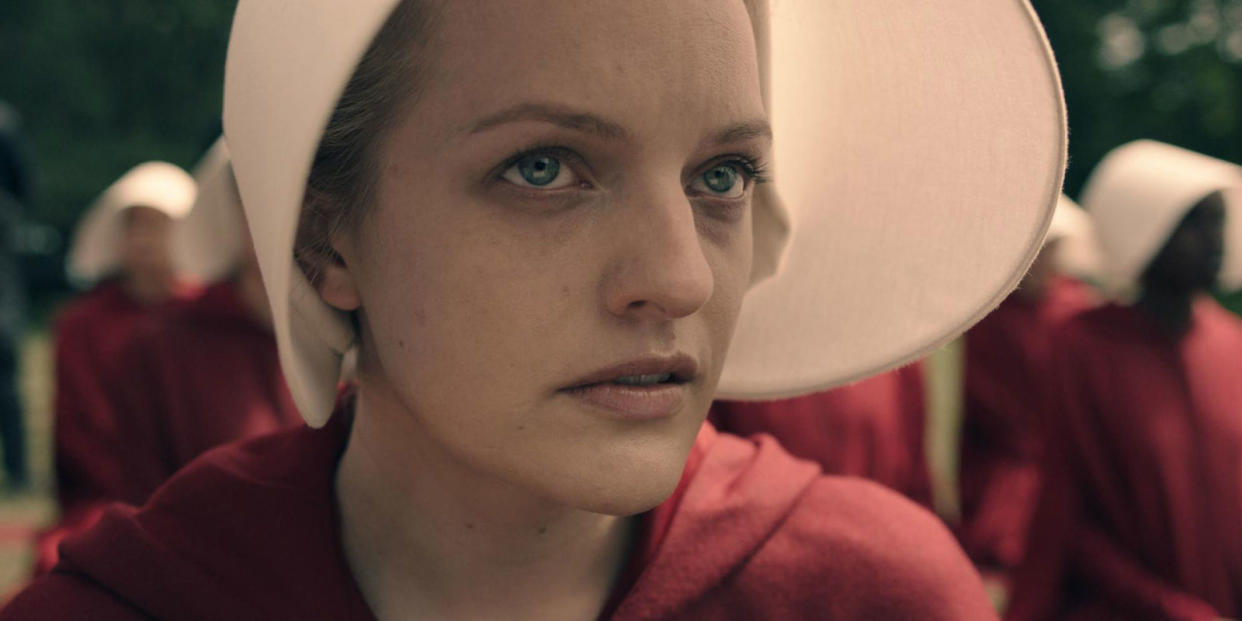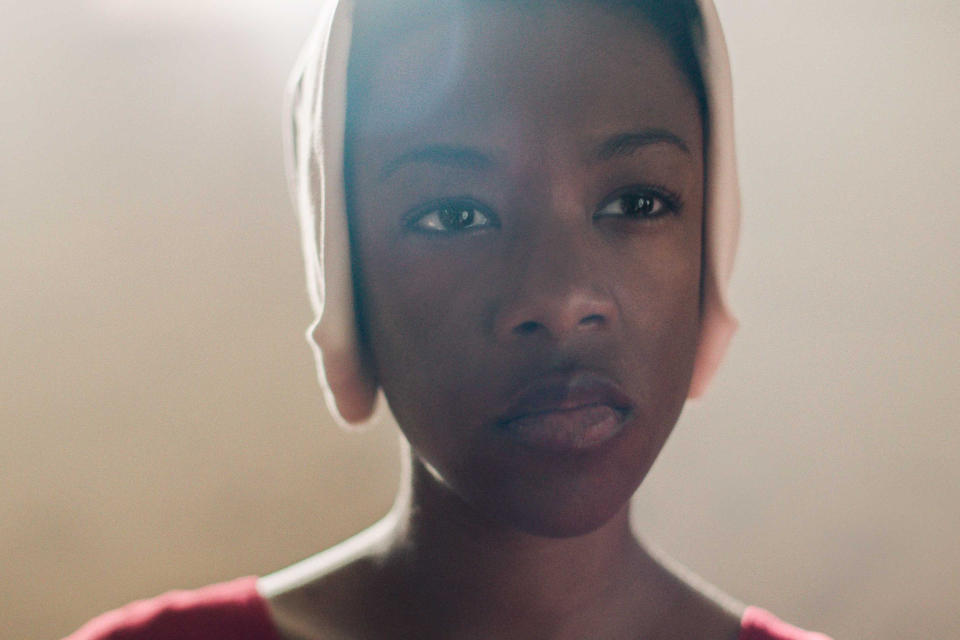'The Handmaid's Tale' Is Scary Because It's Too F*cking Real

In 1986, Margaret Atwood's dystopian novel The Handmaid's Tale seemed far-fetched and unrealistic. In her New York Times review, Mary McCarthy wrote, "Surely the essential element of a cautionary tale is recognition. Surprised recognition, even, enough to administer a shock. ... It is an effect, for me, almost strikingly missing from Margaret Atwood's very readable book The Handmaid's Tale, offered by the publisher as a 'forecast' of what we may have in store for us in the quite near future."
Thirty years later, however, and "it doesn't feel unfamiliar enough," writes Rolling Stone. The Hollywood Reporter's review concludes that, "regretfully, the 30-plus-year-old work has become a story for the very time and place we're living in; this is probably the spring's best new show and certainly its most important."
The Handmaid's Tale is so topical in Donald Trump's America, in fact, that Hillary Clinton drew parallels between Hulu's TV adaptation and the United States of 2017 during a speech supporting Planned Parenthood on Tuesday night.
"The show has prompted important conversation about women's rights and autonomy. In The Handmaid's Tale, women's rights are slowly, gradually stripped away" she said, according to a CNN report from the event. "As one character says, 'We didn't look up from our phones until it was too late.' It's not too late for us, but we have to encourage the millions of women and men who support Planned Parenthood's mission to keep fighting."
The series takes place in a near-future U.S., the country having been taken over by a theocratic dictatorship that forbids women from reading, writing, or earning money and forces them into rigid societal roles. After an infertility plague, the titular Handmaids are forced into sex slavery for the society's most powerful men and tasked with bearing their children. They're concubines, essentially, though their purpose is purely for procreation.
Though the specific danger of America being overthrown by a group of religious extremists attempting to start a new society based on the Book of Genesis isn't exactly imminent, there are parallels in our current society that seem like big red warning flags - especially for women.
On Monday, the day before Clinton's speech, Donald Trump ended Michelle Obama's "Let Girls Learn" initiative, a program facilitated through the Peace Corps that helped provide education for adolescent girls in developing nations. While a White House spokesperson denied any changes had been made to the program, CNN obtained an internal document and a Peace Corps staff-wide email that said otherwise.
In February, an Oklahoma state congressman introduced a bill (HB 1441) that would require men to approve all abortions. Women would need to provide a note from their sexual partner consenting to the procedure, along with his name (so he could protest just in case he had any objections).
"I believe one of the breakdowns in our society is that we have excluded the man out of all of these types of decisions," Justin Humphrey told The Intercept of his bill. "I understand that [women] feel like that is their body. I feel like it is a separate - what I call them is, is you're a 'host.' And you know when you enter into a relationship you're going to be that host and so, you know, if you pre-know that then take all precautions and don't get pregnant."
The fact that The Handmaid's Tale plotline gets more and more topical each day is something its stars have certainly considered.
"We filmed this pre-election and post-election. We finished shooting in Toronto mid-February. We were into Trump's presidency," says Yvonne Strahovski, who plays Serena Joy Waterford, a barren commander's wife. "It's hard enough to acknowledge that there've been a lot of headlines that have come out since Trump has been elected about women's rights, derogatory commentary on women, photographs of men in suits deciding what women are supposed to do with their bodies and what our rights are going to be. It's really hard to ignore that, and I personally can't. It really hits hard. When you watch a show like this, it's alarming because I draw the parallels, for sure."
After the election, the stakes got even higher.
"We have a responsibility to really have some integrity when we're shooting this show, to make sure that we do a good job," says Samira Wiley, who plays Moira, one of the Handmaids. "I think that it has definitely become a lot more relevant than we really wanted it to be."

Wiley hopes viewers will be able to draw those parallels Strahovski mentioned and perhaps even use the series as a wake-up call for the politically apathetic.
"It doesn't happen just all at once. There are little things that happen that are perplexing, but don't necessarily seem that scary in the beginning because you don't think the next step is going to happen. You realize when watching the show how it crept up on these people," Wiley says. "I hope that that's a real cry to the people watching it of how vigilant we need to be."
Strahovski says, "I think what the show does beautifully is really paint this picture of how easily we could flip into a society like that. It's not that long of a road and it's not that hard. It is a warning sign that things can get really chaotic if you take that religious fundamentalist mentality to a whole new political level, and what happens to a society when you create these rules that are to the point of being life-threatening if you break them, in a very unfair way, and what happens when you strip women of their rights."
Regardless of how extreme things get in the fictional world of Gilead, it hasn't desensitized The Handmaid's Tale stars to the barrage of attacks on women's rights in 2017.
"I wake up and I think, 'This is fucking crazy,'" Strahovski says.
Follow Jean on Twitter and Redbook on Facebook.
In 1986, Margaret Atwood's dystopian novel The Handmaid's Tale seemed far-fetched and unrealistic. In her New York Times review, Mary McCarthy wrote, "Surely the essential element of a cautionary tale is recognition. Surprised recognition, even, enough to administer a shock. ... It is an effect, for me, almost strikingly missing from Margaret Atwood's very readable book The Handmaid's Tale, offered by the publisher as a 'forecast' of what we may have in store for us in the quite near future."
Thirty years later, however, and "it doesn't feel unfamiliar enough," writes Rolling Stone. The Hollywood Reporter's review concludes that, "regretfully, the 30-plus-year-old work has become a story for the very time and place we're living in; this is probably the spring's best new show and certainly its most important."
The Handmaid's Tale is so topical in Donald Trump's America, in fact, that Hillary Clinton drew parallels between Hulu's TV adaptation and the United States of 2017 during a speech supporting Planned Parenthood on Tuesday night.
"The show has prompted important conversation about women's rights and autonomy. In The Handmaid's Tale, women's rights are slowly, gradually stripped away" she said, according to a CNN report from the event. "As one character says, 'We didn't look up from our phones until it was too late.' It's not too late for us, but we have to encourage the millions of women and men who support Planned Parenthood's mission to keep fighting."
The series takes place in a near-future U.S., the country having been taken over by a theocratic dictatorship that forbids women from reading, writing, or earning money and forces them into rigid societal roles. After an infertility plague, the titular Handmaids are forced into sex slavery for the society's most powerful men and tasked with bearing their children. They're concubines, essentially, though their purpose is purely for procreation.
Though the specific danger of America being overthrown by a group of religious extremists attempting to start a new society based on the Book of Genesis isn't exactly imminent, there are parallels in our current society that seem like big red warning flags - especially for women.
On Monday, the day before Clinton's speech, Donald Trump ended Michelle Obama's "Let Girls Learn" initiative, a program facilitated through the Peace Corps that helped provide education for adolescent girls in developing nations. While a White House spokesperson denied any changes had been made to the program, CNN obtained an internal document and a Peace Corps staff-wide email that said otherwise.
In February, an Oklahoma state congressman introduced a bill (HB 1441) that would require men to approve all abortions. Women would need to provide a note from their sexual partner consenting to the procedure, along with his name (so he could protest just in case he had any objections).
"I believe one of the breakdowns in our society is that we have excluded the man out of all of these types of decisions," Justin Humphrey told The Intercept of his bill. "I understand that [women] feel like that is their body. I feel like it is a separate - what I call them is, is you're a 'host.' And you know when you enter into a relationship you're going to be that host and so, you know, if you pre-know that then take all precautions and don't get pregnant."
The fact that The Handmaid's Tale plotline gets more and more topical each day is something its stars have certainly considered.
"We filmed this pre-election and post-election. We finished shooting in Toronto mid-February. We were into Trump's presidency," says Yvonne Strahovski, who plays Serena Joy Waterford, a barren commander's wife. "It's hard enough to acknowledge that there've been a lot of headlines that have come out since Trump has been elected about women's rights, derogatory commentary on women, photographs of men in suits deciding what women are supposed to do with their bodies and what our rights are going to be. It's really hard to ignore that, and I personally can't. It really hits hard. When you watch a show like this, it's alarming because I draw the parallels, for sure."
After the election, the stakes got even higher.
"We have a responsibility to really have some integrity when we're shooting this show, to make sure that we do a good job," says Samira Wiley, who plays Moira, one of the Handmaids. "I think that it has definitely become a lot more relevant than we really wanted it to be."

Wiley hopes viewers will be able to draw those parallels Strahovski mentioned and perhaps even use the series as a wake-up call for the politically apathetic.
"It doesn't happen just all at once. There are little things that happen that are perplexing, but don't necessarily seem that scary in the beginning because you don't think the next step is going to happen. You realize when watching the show how it crept up on these people," Wiley says. "I hope that that's a real cry to the people watching it of how vigilant we need to be."
Strahovski says, "I think what the show does beautifully is really paint this picture of how easily we could flip into a society like that. It's not that long of a road and it's not that hard. It is a warning sign that things can get really chaotic if you take that religious fundamentalist mentality to a whole new political level, and what happens to a society when you create these rules that are to the point of being life-threatening if you break them, in a very unfair way, and what happens when you strip women of their rights."
Regardless of how extreme things get in the fictional world of Gilead, it hasn't desensitized The Handmaid's Tale stars to the barrage of attacks on women's rights in 2017.
"I wake up and I think, 'This is fucking crazy,'" Strahovski says.
Follow Jean on Twitter and Redbook on Facebook.
You Might Also Like

